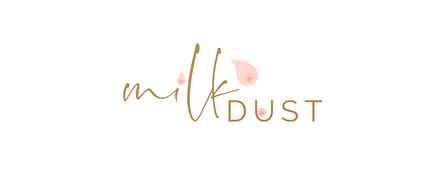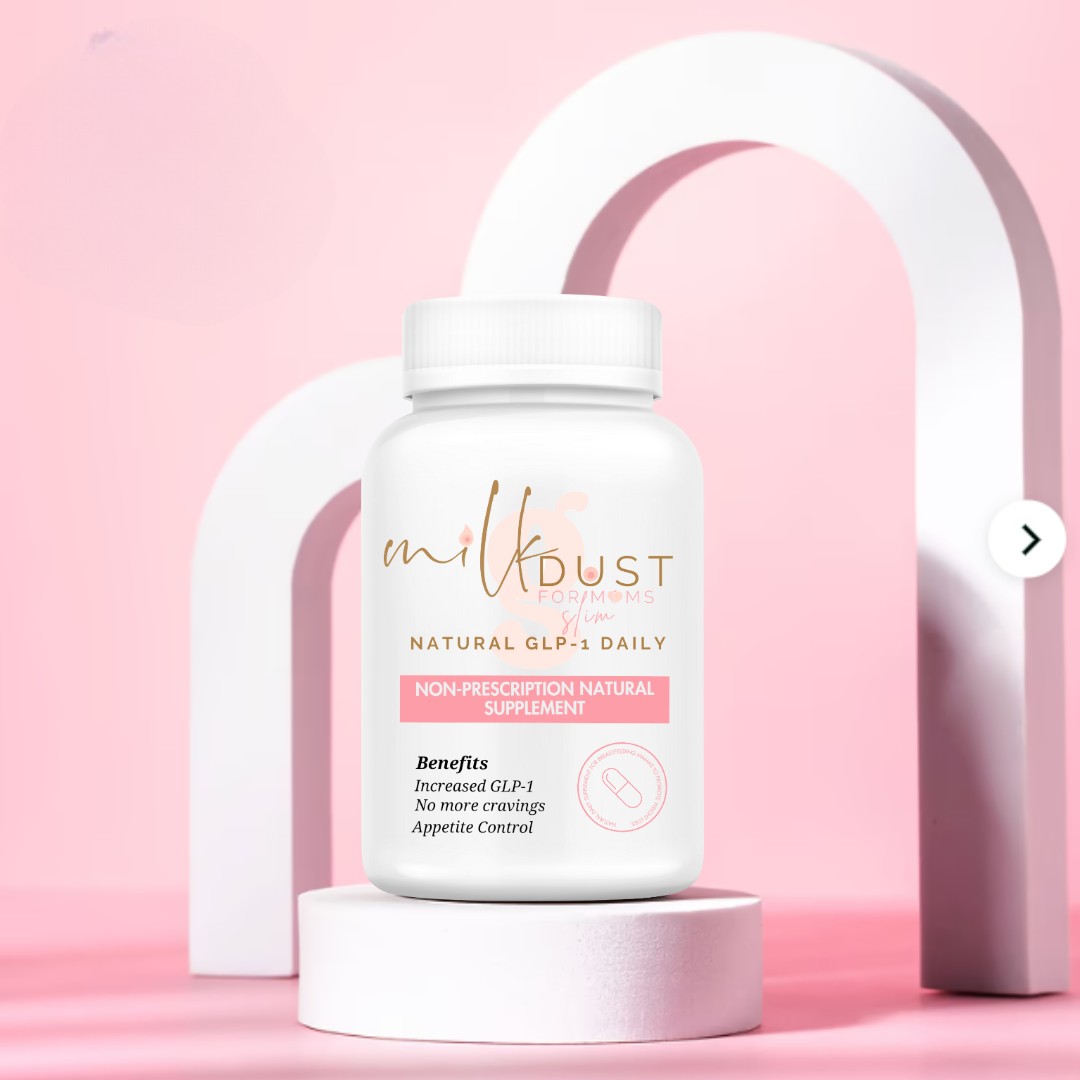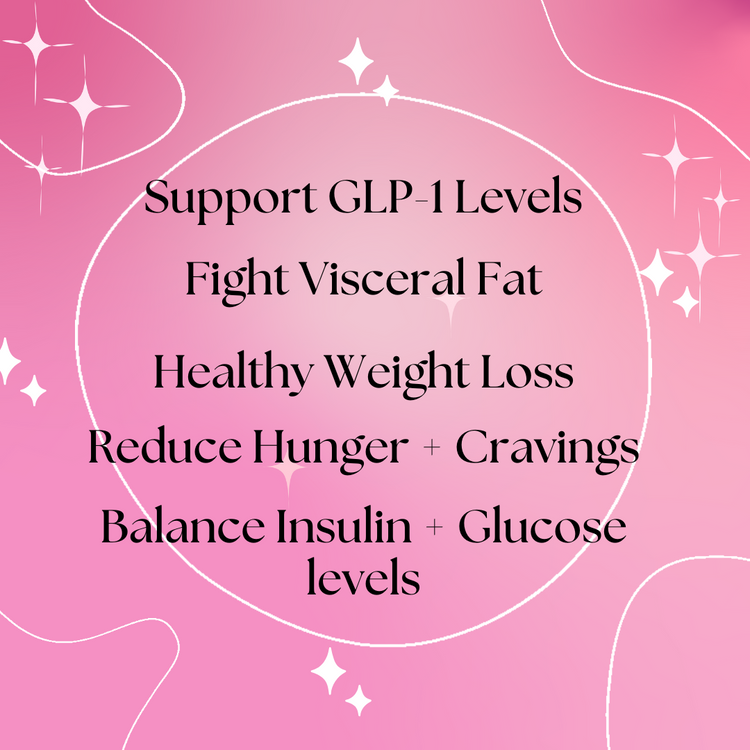I've been relying on protein shakes to help me keep up my milk supply and lose the baby weight with all four of my babies. Before I had Milk Dust Lactation Protein Powder, I used other plant-based protein powders to make sure I was getting enough protein. Protein is really important when you are both breastfeeding and postpartum. It plays an important role in helping to repair your body after birth, as well as lactation! Studies and medical professionals like to suggest 25 extra grams of protein per day while breasgfeeding. That is actually quite a bit of protein, and when you are busy with a baby it can be hard to make enough meals! It is also sometimes hard because if you are like me, you don't crave protein at all! I craved sugar and carbs the whole time I was breastfeeding all of my babies! Finally, when I had Milk Dust with my fourth, I was so happy because my sugar cravings were gone!
Since I had my first baby, I've been researching and trying protein powders while breastfeeding. I didn't always know which protein powder was best, but I found that protein powders were extremely useful, beneficial, convenient and a yummy way to get in extra protein that I really needed while breastfeeding. I found that protein shakes really helped me keep my appetite under control and stop my sugar cravings. But, I had a hard time still with drinking all the teas and lactation herbs on top of my protein powder. I knew I really wanted a protein powder formulated to increase milk supply, help me with my sugar cravings, and also act as a nutritional supplement to help me with all the nutrients I really needed. That's where Milk Dust emerged, as a safe plant-based protein powder that moms can use to help them with postpartum weight loss, milk supply and sugar cravings.
Overall, protein powders are very safe for breastfeeding, and I wish more mamas would look into using protein powders as a daily nutritoinal supplement to help with nourishment postpartum. No supplement is perfect, but if the ingredients are sourced safely in the USA, tested and well controlled, then protein powders are extremely benefitical. I highly recommend adding a good protein powder to your breastfeeding diet, and I will go over more details on the importance of protein, how to choose a safe protein powder, the various kinds of protein powders and more.

Understanding Protein Needs During Breastfeeding
When a new mom is breastfeeding, the body needs more protein to support lactation and metabolism, and other bodily functions. Protein intake is directly linked to postpartum health and milk supply, so trying to get in as much protein as you can is really important Protein also plays a major role in increasing metabolism, maintaining muscle mass and reducing hunger and cravings. Reducing hunger and cravings is one of the main reasons protein is so helpful for breastfeeding moms. I found that if I just made a quick protein shake, even if I was craving something else, it would transform the rest of my day! The days I didn't get my protein shake in were dramatically different! I was hungrier, wanted more chocolate, and didn't have as much energy! Because making a protein shake was so quick and easy, I could get myself to do it much easier than grill some chicken or eat an egg. AND, I found my FAVORITE chocolate frapp recipe with the Milk Dust Fudge Brownie. I literally loved it more than Starbucks and had it every morning over and over! That's the beauty of a good protein powder, you can make some amazing recipes and shakes that you crave more than a hard-boiled egg or chicken breasts!. It's fascinating how this macronutrient serves as one of the building blocks of breast milk, supplying essential amino acids necessary for my baby's healthy development.
Experts suggest that breastfeeding moms need about 1.1 grams of protein per kilogram of body weight each day. This is a step up from the usual recommendation, ensuring both the new moms and their babies receive enough protein for optimal health. I found integrating this into my daily routine not just necessary, but empowering—knowing each gram was nourishing my baby and aiding in my own recovery process. With this goal in mind, I meticulously chose foods and supplements that were rich in high-quality protein, balancing my diet to meet our combined nutritional needs.
QUICK BENEFITS OF PROTEIN POWDER WHILE BREASTFEEDING:
-
Protein powders are easily absorbed and metabolized
-
Often have extra nutrients for a more complete nourishment
-
Taste great
-
Have additional, milk-boosting ingredients
- Usually offer at least 10-20 grams of protein per serving
Protein powders are one of the best tools I've found for eating healthy and losing weight postpartum. I've had to lose the baby weight 4 times now, and protein powders have been essential to losing fat and keeping my milk supply. I didn't have Milk Dust with my first 3 babies, but with my fourth I did. I couldn't believe the different it made! I was able to lose weight, keep my energy up and keep my milk supply! I was much older with my fourth (34 when I had him!), which can often times make weight loss much harder, but because I have Milk Dust, I lost the weight and have kept it off 2.5 years later. Whether you use Milk Dust, or any other protein powder (and I have a list of options below!), you will find that they are super helpful to managing cravings, appetite and burning fat after pregnancy.
There are a lot of protein powders on the market, so I wanted to make a list of some of the top lactation protein powders, so you can choose which one is the right one for you.
Choosing Safe Protein Powders
Choosing a protein powder while breastfeeding can be overwhelming because not all protein powders are made for breastfeeding, and not all of them are safe for breastfeeding. There are some super important factors to consider before you choose a protein powder. When choosing a protein powder, looking for a company that states they source and manufacture in the USA is really important, as well as a company that does third-party testing for heavy metals and toxins like mold. Usually, companies will state somewhere on their website or label where their product is manufactured and if it is tested by a third party.
Then, you want to look at the ingredients to see what kind of chemicals, artificial sweetners, flavors and colors might be added to the formula. The least amount of additives is the best, but there are some ingredients that are small in amount, like xanath gum, that aren't bad and just used as a stabliizer for texture and consistency. If you have a protein powder with mostly clean ingredients, it is almost always better than the artificial flavors and chemicals found in many other breads, pastas, chips and crackers.
The other aspect to look at is the kind of protein powder you want to choose. There are a lot of options like, pea protein, whey, or collagen, helped me understand the product's quality and safety. I must say, steering away from the unnecessary extras and sticking to powders with a straightforward, organic ingredients list made all the difference.
PLANT-BASED OR WHEY PROTEIN POWDER WHILE BREASTFEEDING?
If you are new to protein powders, it can be overwhelming to know which type of protein powder to choose. I am personally a proponent of plant-based protein powders because you can add a lot more important nutrients into these blends. It is difficult to add seeds, fruits and veggies to a whey protein formula. The ingredients don't usually blend well together. The plant-based protein powders help round out a full meal with proper nutrition and a good intake of protein, while the whey-based protein powders focus more on being an easy way to get in extra protein and extra calories.
Whey and animal-based protein powders can be hard to digest, both for moms and babies. There are many babies that are sensitive to dairy, causing extra gassiness or colic. Milk Dust is a plant-based protein powder, but because it uses pea protein, it has a complete amino acid profile that you get in an animal or whey-based protein powder. I personally believe a plant-based protein powder can offer a more diverse blend of nutrients and ingredients, which have a more powerful affect on milk supply. Whey-based protein powders do blend much creamier and fluffier than plant-based protei npwoders, so that is definitely something to keep in mind. Whey protein powders typically can offer a more adequate amount of protein per serving too. I find that I don't mind if there are a couple less grams of protein per serving, if I am also getting the amazing health benefits of additional vitamins and minerals from that additional nutrients.
Plant-based protein powders can be a little higher in heavy metals, but that isn't because of contamination, but the natural metals and minerals found in the soil where the plants grow. Testing for heavy metals is important, and some metals isn't as concerning as other things like mold and contamination.
If you don't like the texture of a plant-based protein powder, you can try blending it with different milks. Oatmilk can help make it creamier, as well as coconut cream or milk.
I am going to get into the best protein powders on the market for breastfeeding mamas, which are all plant-based and full of extra nutrients. This is key for lactation and postpartum. I will of course go over Milk Dust in depth, because I believe it is the best on the market, but there are some other good products to choose from, and I want to make sure you have all the information.
Pros and Cons
I've been riding the fence, so let me share the pros and cons based on my dive into this topic.
- Pros: Highlighting the positives, protein powder can be a great way to meet your adequate amount of protein needs efficiently, especially on those days when preparing protein-rich foods feels like climbing Mount Everest. It's about convenience—mixing a scoop into your morning smoothie can boost your protein intake without much fuss, which is crucial because let me tell you, getting enough protein is essential for both your recovery and your baby's growth. And if you're someone who struggles with morning sickness or a lack of time, a clean protein shake can be a lifesaver.
- Cons: However, not all powders are created equal. The market is cluttered with options that are laden with heavy metals, artificial sweeteners, and other harmful substances. These can be counterproductive, affecting not just you but your baby's health too. Plus, relying too heavily on supplements can lead us to miss out on other important nutrients from whole food protein sources that are vital for both the breastfeeding mother and the growing baby. It's about finding that balance and ensuring we're not substituting essential nutrients with convenient scoops of powder.
How Much Protein is Too Much?
I've been swirling around the topic of protein powder and breastfeeding, diving deep into how much protein really benefits us and the bundle of joy we're nourishing. With a plethora of protein-rich foods and supplements waving at us from every corner, it's essential to reel in and ponder, how much protein is too much? Navigating through the maze of nutritional needs, it dawned on me that while protein plays an important role in milk production and postpartum recovery, there's a fine line between just enough and excessive.
In the quest for the best protein powder, amidst deciphering labels dotted with whey, pea, or plant-based protein powder, I stumbled upon a crucial bit of intel. For breastfeeding moms, the intake of protein should be carefully measured - a kilogram of body weight demands its fair share, yet not a gram more. Regular diet routines, pockmarked with adequate protein from clean protein powder or whole food sources, should suffuse our daily routine, sans the overboard heap of extra protein. This delicate balance is the cornerstone of optimal nutrition, ensuring us new moms an easy way to meet specific requirements while fostering a healthy development for our growing baby.
Integrating Protein Powder into Your Diet
I've discovered some truly easy ways to weave protein powder into my daily routine, ensuring I hit the adequate amount of protein needed to nourish both me and my baby. One of my go-to's is blending a scoop of clean protein powder with fresh fruits and a handful of spinach for a morning shake that's both delicious and nutritious. It's an excellent way to kickstart the day, especially when time is of the essence. For snacks, I've taken a liking to making a batch of bliss balls using plant-based protein powder, oats, and natural sweeteners like organic monk fruit extract—perfect for quelling those midday sugar cravings. And let's not forget the power of smoothies; incorporating a blend of dairy-free milk, a scoop of pea protein, and a variety of other foods can significantly boost your protein intake without much effort. These small adjustments to my eating habits have made a big difference in maintaining my energy levels and supporting my milk production, proving that getting that extra protein doesn't have to be complicated.
Eating a healthy diet while breastfeeding is essential because many postpartum mothers are undernourished but overfed.
The hard reality is that new mothers often jump on the train of eating more to make more milk, but eating more doesn't always mean eating more nutrients. According to this outline by the University of Washington, describing care and nutrition for postpartum mothers,
"The increase in energy utilization increases needs for some nutrients (e.g., thiamin and niacin). Recommended intakes for other nutrients (e.g., copper, iodine, manganese, biotin, choline, riboflavin, and folate) are increased, based on the amount of the nutrient secreted in milk."
There are numerous vitamins and minerals that a new mom needs more of while breastfeeding. These increased nutrient needs are not satisfied with increasing calories alone, which is why I am such a huge proponent of eating nutrient-dense foods at every snack and meal.
I created Milk Dust as an delicious protein powder that fills all of these nutrient needs in breastfeeding mothers. Milk Dust not only fills the nutrient gaps, it also helps crush sugar cravings and increase milk supply! Milk Dust has a lactation blend that will boost your supply in addition to nourish your body, so low milk supply won't be an issue any more! There are no other safe protein formulas on the market that do all of this together.
When you use Milk Dust in your breastfeeding diet plan, you will be so happy to see how much milk you can produce!
"Milkdust saved my postpartum season!!! I saw ads and took a chance because I was desperate. I started working out consistently and eating very clean at 6 weeks postpartum (second kid) but I kept gaining weight instead of losing it! I was so discouraged and ready to try anything…so I bought milkdust protein powder and the metabolism boost. I started using it as a meal replacement because I wasn’t scared my supply would suffer and in one month I lost 5 pounds and the weight keeps coming off! My supply is great and I am so thankful I found milkdust. It will forever be in my postpartum essentials!"
Lindsey S.
MILK DUST OFFERS ADDITIONAL PROTEIN REQUIRED DURING LACTATION:
For example, protein consumption is directly related to milk volume in studies. A protein supplement was really important for me when creating a lactation product because many mothers, including myself at the time, were struggling to get in enough protein and limit sugar. With cravings, lack of sleep, and hormonal rollercoasters, not many mothers are craving high-protein foods like eggs and chicken. I wanted a protein powder that provided a sweet, delicious taste, but also offered a lot of protein. This study illustrates the increased need of protein during lactation, and a supplement like Milk Dust to fill those needs in a way that tastes amazing and is convenient.
The Milk Dust Lactation Protein Blend is full of clean ingredients and plant-based proteins that provide the essential amino acids necessary to support postpartum lactation. I've found that new moms need a plant-based protein blend because dairy or soy can be irritating to newborns. Plant-based protein powders can also offer additional nutrients that animal based protien powders can not.
THE MILK DUST PROTEIN BLEND IS TAILORED TO BREASTFEEDING MOTHERS:
Each serving of Milk Dust offers 16 grams of protein, and all of this protein comes from natural ingredients. Plant proteins are a safe way to consume extra protein without having to eat a ton of eggs, or even dairy which many people are sensitive to. The best choice when it comes to choosing between safe protein powders. A breasfeeding mom particulalry needs to stick to a breastfeeding protein powder that is free of artificial sweeteners (like Milk Dust), because other protein powders with whey, casein or soy can cause tummy issues in newborns who may have a lactose intolerance. Of all the protein supplements on the market for a breastfeeding mother, Milk Dust has the most comprehensive and diverse vegan protein powder blend.










